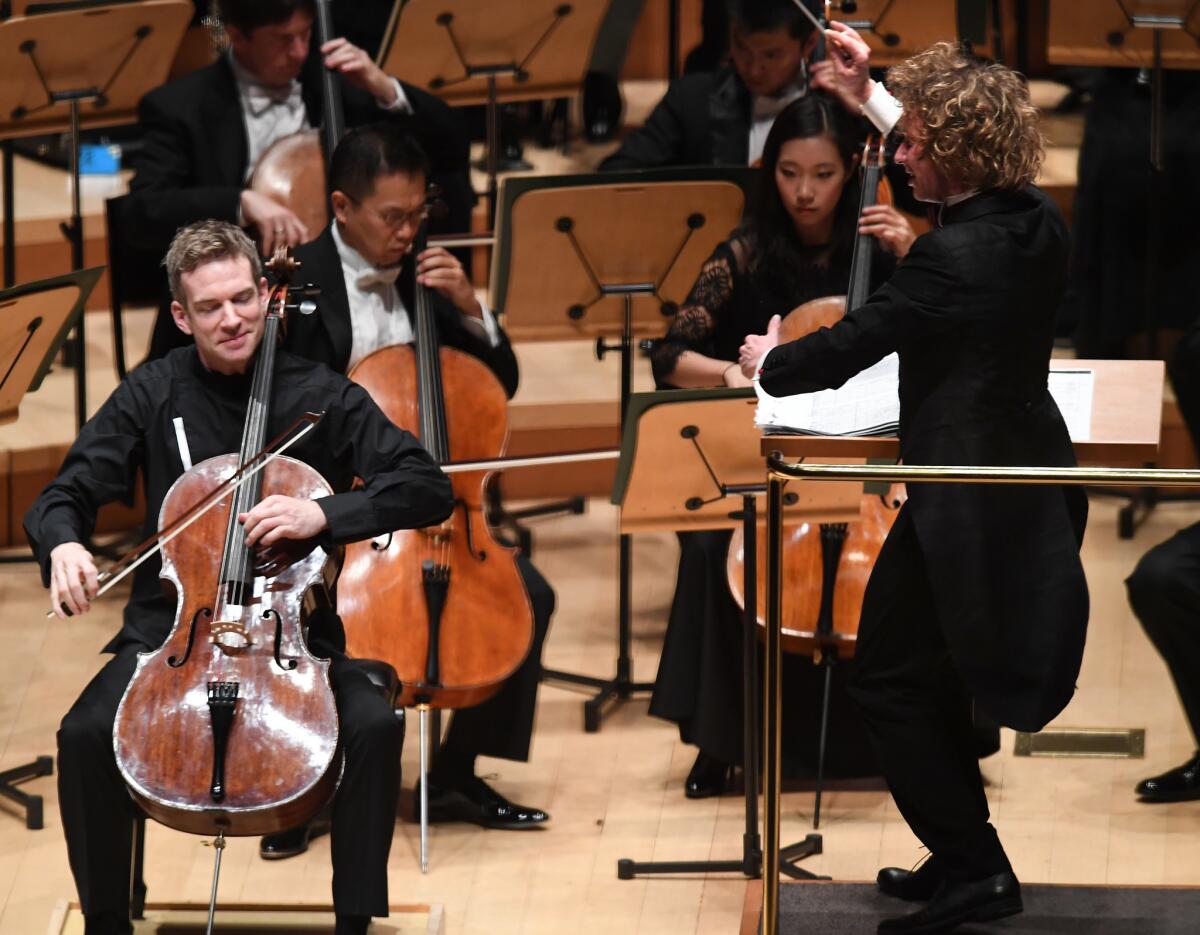Review: The next new Finnish star conductor takes the stand in Disney Hall

Not everything is a surprise with Santtu-Matias Rouvali, a 31-year-old former Los Angeles Philharmonic Dudamel Fellow who returned Friday night to Walt Disney Concert Hall for his first subscription concert with the L.A. Phil.
Rouvali, just appointed music director of the Gothenburg Symphony in Sweden, is Finnish â yet further confirmation that his small country produces more major conductors per capita than anyplace else.
He is of slight build and has a bushy mop of hair. Weâve had a few of those over the years.
And he has a certain flamboyance. Ditto, even if the stereotypical Finn tends not to be demonstrative.
But Rouvaliâs imaginative, often spectacular musicality is exceptional even in an era with a number of remarkable young conductors.
His program here was commonplace and weighed down with warhorses: DvorĂĄkâs Cello Concerto with Johannes Moser as soloist and Sibeliusâ First Symphony.
A week earlier at Duke University in North Carolina, Moser joined the Pacifica Quartet for the world premiere of a new string quintet by the newly minted MacArthur Fellow Julia Wolfe. Moser, moreover, will also premiere a new piece by L.A. composer Ellen Reid in February as part of this yearâs Laguna Beach Music Festival. Meanwhile, Rouvali makes his debut with the Cincinnati Symphony next week conducting Sibeliusâ more challenging last two symphonies (Nos. 6 and 7) along with Esa-Pekka Salonenâs Violin Concerto (with Jennifer Koh as soloist).
Next to Durham and Cincinnati, L.A. might have seemed uncharacteristically uninventive. It wasnât. We compensated with riveting, original music making, everything seeming not only vital but oddly relevant.
The outlier work was Alexander Mosolovâs âIron Foundry,â a four-minute 1927 Soviet exclamation of a machine age promising to transform Russian society and its art. Relying on the thrill of noise and dissonance in this balletic tidbit, Mosolov anticipated by more than half a century industrial rock and heavy metal. The Constructivist score today might well resonate with many angry Americansâ nostalgia for an era of factories run by manpower.
The L.A. Phil happened to give the premiere in 1931 of âIron Foundryâ at the Hollywood Bowl. I donât know whether or not Charlie Chaplin was at that concert (he might have been), but Rouvali made it seem that way in a spectacular performance that brought to mind Chaplinâs 1936 silent (with sound effects) comedy, âModern Times.â
Rouvaliâs conducting is all arms. He traces everything in the score, including the tiniest detail, with the extravagance of an animated computer graphic. He is, in his movements, downright Chaplinesque, if without the haplessness. Like Chaplin, Rouvali is always in complete control. Every gesture seems driven by an inner musicality. His âIron Foundryâ proved an astonishment.
DvorĂĄkâs Cello Concerto, written not much more than a quarter-century earlier in New York, is New World music with an Old World sensibility. Moser, a sophisticated and sensitive cellist, here demonstrated a rare, raw passion. The zealous Rouvali became now and then overbearing, but he mostly doubled Moserâs ardor.
Something obviously was on this commanding German-Canadian cellistâs mind. For his encore, he said he was dedicating an intense, stirring performance of the Sarabande movement from Bachâs First Solo Cello Suite to Hillary Clinton and to Leonard Cohen. The audience roared for Hillary, but there may have been a couple boos; it was hard to tell.
Rouvaliâs Sibelius was full of more Modernist beans. Often conductors, besotted with Sibeliusâ soulfulness, look to the First for the first hints of the composerâs brooding, haunting, unforgettable soundscapes. The symphony does, after all, open with a somber clarinet solo.
But written at the cusp of the 20th century, this was also the work of a composer in his early 30s who had already found his voice and was setting out on an adventure. Rouvali combed through the pages of the First for new discoveries, something potent in the timpani or bird-like in the flute or overgenerous in the horns. When it was over, an orchestra skilled at giving a young conductor it likes everything asked of it, no matter how outrageous, was all warm smiles.
Rouvali is in the right place. Gothenburg was where his mentor, Gustavo Dudamel, learned the ropes of running a professional orchestra, a little outside the limelight. Now, once more, the Elite Park Avenue Hotel, just down the street from the GĂśteborgs Konserthus, will be filling up with music business suits eager to sign for the latest sensation.
ALSO
Noh theater: The worldâs oldest stage tradition is popping up everywhere
âAkhnatenâ: How L.A. Opera delivers Philip Glassâ Egyptian Pharaoh tale
Why music from 1594 still moves us in 2016: The deep meaning of âTears of St. Peterâ
More to Read
The biggest entertainment stories
Get our big stories about Hollywood, film, television, music, arts, culture and more right in your inbox as soon as they publish.
You may occasionally receive promotional content from the Los Angeles Times.











